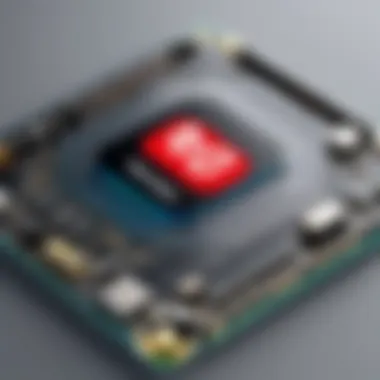Evaluating the Cost of Verizon 5G Service


Intro
The landscape of mobile connectivity continues to evolve, particularly with the advent of 5G technology. Verizon has positioned itself as a leading provider in this domain, offering various plans and pricing structures. Understanding the true cost of Verizon's 5G service requires careful examination of several factors that influence pricing. This overview will guide IT professionals and tech enthusiasts through the essential aspects to consider while evaluating Verizon’s offerings. By breaking down the components of pricing, service tiers, and market comparisons, we can develop a clearer understanding of what consumers can expect.
Performance Metrics
Benchmarking Results
Performance is a critical aspect when considering a 5G service. Verizon's network has undergone extensive testing to evaluate its capabilities. A key metric is the average download speed, which often outpaces competitors in many regions. Reports indicate that Verizon's 5G network can deliver speeds exceeding 900 Mbps, especially in urban environments. This speed has a significant impact on how users experience streaming, gaming, and browsing.
Speed and Responsiveness
In addition to download speeds, latency plays a crucial role in user experience. Verizon's 5G technology boasts very low latency levels, typically around 20 milliseconds, enhancing real-time applications such as video calls and online gaming.
"High latency can hinder the effectiveness of interactive applications, making low-latency services essential for users who require prompt responses."
Furthermore, the capacity of the network also deserves attention. Verizon’s infrastructure supports a greater number of devices without compromising speed, which is particularly beneficial in densely populated areas. Users looking to maximize their experience should consider the specific coverage map provided by Verizon to determine availability in their location.
Usability and User Experience
Ease of Installation and Setup
Verizon’s setup process for 5G service is generally straightforward. Installation often involves a few steps to connect devices. Customers can choose to do self-installation using an app or request professional assistance from Verizon. The self-installation method provides flexibility but may require some technical knowledge.
Interface Design and Navigation
The interface of Verizon's customer portal is designed with user navigation in mind. Users can easily access their account information, change plans, and set up add-on features. There is also robust customer support options, available through chat and phone support, which are essential for resolving issues.
Prolusion to Verizon 5G Service
In recent years, the evolution of mobile communication technology has significantly transformed how people connect and interact. The introduction of Verizon's 5G service plays a crucial role in this landscape. This section will provide an overview of the essence of 5G technology, focusing on its impact on consumers and businesses alike. The rapid adoption of 5G services is not merely about faster internet speeds; it represents a shift towards increased connectivity, which has limitless potential in various sectors.
Importance of 5G: Understanding the features and benefits of Verizon's 5G offering is indispensable for consumers evaluating their options. Enhanced bandwidth, lower latency, and the capacity to support a more extensive network of devices are just some of the advantages that 5G brings. These elements come together to create opportunities for innovation and efficiency.
Key Considerations: For potential users, several considerations must be assessed when looking at Verizon's 5G service. Factors like coverage area, pricing models, and device compatibility can directly influence the overall user experience. Evaluating these aspects comprehensively can lead to more informed decisions for both personal and professional needs.
Overview of 5G Technology
5G represents the fifth generation of mobile telecommunications, succeeding its predecessors in performance and efficiency. The fundamental shift from 4G to 5G involves various technological improvements. Key advancements include increased data transfer speeds reaching up to 10 gigabits per second, which is exponentially faster than 4G. Furthermore, 5G networks can support up to 1 million devices per square kilometer, enabling the ''Internet of Things'' (IoT) to thrive.
These features lead to seamless connections and enhanced experiences in areas such as augmented reality, remote work, and smart city initiatives. 5G technology is not limited to smartphones. It impacts countless sectors from healthcare, automation, to smart infrastructure, making it a pivotal advancement.
Verizon's Position in the Market
Verizon has established itself as a leader in the telecommunications industry, especially with the rollout of 5G services. Their approach to technology adoption and innovation has positioned them favorably against competitors. The company's infrastructure investments and strategic partnerships have enabled them to offer extensive coverage across urban and suburban areas.
Verizon's 5G network is recognized for its reliability, which can lead to increased customer loyalty. The company's ability to adapt to market demands while maintaining high-quality standards sets it apart. Additionally, their comprehensive plans cater to different needs, making Verizon a strong choice for both everyday users and businesses seeking robust connectivity solutions.
Understanding Verizon 5G Pricing Models


Understanding the pricing models offered by Verizon's 5G service is essential for consumers looking to make informed decisions on their mobile connectivity. This framework not only illustrates how the various plans are structured but also provides insight into their long-term financial implications.
The expenses associated with using Verizon's 5G service encompass more than just the monthly bills. Additional fees and costs can affect the total expenditure significantly. Therefore, a thorough grasp of these details adds clarity to what Verizon consumers can expect.
In this section, we will discuss the following aspects:
- Monthly Plan Structures
- One-Time Costs and Fees
Each of these elements displays how different pricing strategies cater to a variety of user needs. Whether it’s an individual, family, or business plan, comprehending the specifics helps consumers select the optimal option that aligns with their consumption patterns and budget constraints.
Monthly Plan Structures
Verizon offers a range of monthly plans designed to cater to diverse consumer preferences. Understanding these different structures is crucial. Monthly plans often come with varying limits related to data usage, premium features, and pricing tiers. The plans may include unlimited data or have strict data allowances, both of which have their own sets of consequences regarding performance.
- Unlimited Plans: Many consumers opt for unlimited data plans due to the convenience they provide. However, it is important to understand that unlimited does not necessarily mean unrestricted; there may be deprioritization during congestion.
- Data-Capped Plans: These plans provide lower costs but require careful monitoring of data usage. Overage charges can accumulate quickly, impacting the overall budget.
Therefore, a careful evaluation of user habits is essential. Users who stream, game, or frequently connect multiple devices may find unlimited plans to be a better fit. In contrast, casual users might benefit more from capped plans.
One-Time Costs and Fees
In addition to the recurring monthly charges, Verizon 5G service may also incur one-time costs that can be considerable. This aspect should not be overlooked. Customers might encounter activation fees, device payments, and installation costs. Most often, devices such as smartphones or hotspots are sold at retail prices that may range from budget-friendly options to high-end devices.
An example of common one-time fees includes:
- Activation Fee: Usually a set charge applied to new plans to enable service.
- Device Payment: Depending on the model of the device chosen, this can vary significantly. Some devices might be available through financing options, spreading the cost over a period.
These initial costs can weigh heavily on the overall expense structure. Customers must be vigilant to ensure they are not caught off guard by hidden charges.
Understanding the intricacies of Verizon's pricing models provides consumers with a clearer roadmap toward selecting a plan that best meets their financial and usage needs.
Comparison of Verizon 5G Plans
Comparing Verizon's 5G plans is crucial for understanding how different offerings meet the diverse needs of consumers. This comparison sheds light on pricing structures, data allowances, and additional services that may come with each type of plan. By breaking down the various tiers, customers can make informed decisions that align both with their usage patterns and budgetary constraints. This article highlights the fundamental elements to consider when choosing between plan types.
Standard Plans vs. Premium Plans
Verizon offers a spectrum of plans that cater to different consumer needs. Standard plans typically provide basic features at a lower cost. These are suitable for users who primarily utilize data for browsing and social media, without heavy usage demands. On the other hand, Premium plans often include additional benefits such as higher data limits, priority access during congestion, and enhanced streaming quality.
Each option has its own costs and benefits. Customers should assess their typical data usage and consider whether the additional fees for premium features justify the higher expense.
- Standard Plan Features:
- Premium Plan Features:
- Lower monthly fee
- Limited data allowance
- Suitable for casual users
- Higher monthly fee
- Increased data limits
- Enhanced customer service
- Ideal for heavy data users
Family and Shared Plans
Family and shared plans present a compelling choice for households looking to manage costs. These plans enable multiple lines to be bundled together, generating savings compared to individual plans for each member. The flexibility offered in terms of data allocation and plan customization can significantly reduce monthly expenses.


Moreover, families can choose between combined data limits or separate lines with distinct allowances. This adaptability is advantageous for varying usage scenarios within the same household.
- Key Considerations for Family Plans:
- Cost savings by bundling
- Customizable data allowances
- Easier management of monthly expenses
Shared plans appeal to groups of friends or colleagues as well. By pooling resources together, users might unlock better pricing and shared benefits, making it easier to optimize their spending on Verizon's 5G services.
"More users on a plan generally means lower costs per person, making family and shared plans an attractive option for many."
Identifying the right plan type is essential to maximize value while minimizing costs. This comparison of standard versus premium plans, alongside family and shared plans, offers insight into how to choose a service that fits your lifestyle and data needs.
In-Depth Look at Verizon 5G Service Costs
Understanding the costs associated with Verizon's 5G service is essential for consumers seeking to maximize their value. As technology advances, consumers must decipher complex pricing structures that include base fees, data allowances, device costs, and potential additional charges. Knowing these elements allow users to make informed decisions tailored to their specific needs and usage patterns.
Data Allowances and Overage Charges
Data allowances are crucial for consumers who rely on mobile internet. Verizon offers various plans with different data limits. For instance, some plans may provide unlimited data, while others have caps such as 20GB or 50GB per month. When consumers exceed their monthly data allowance, they frequently face overage charges. These charges can vary based on the plan but may add significant costs to the user’s bill. Understanding your data usage habits can help you avoid these unexpected fees.
It's also important to monitor how frequently you go over your data allowance if you opt for a capped plan. Certain applications, like streaming or gaming, can demand substantial data, thus risking overage charges. Verizon does offer tools to keep track of data usage, which can be helpful for consumers.
"Data management is essential to optimizing the cost of any mobile service, especially with varying allowance structures."
Device Costs and Loans
When evaluating 5G service costs, device expenses also play a substantial role. New devices capable of 5G connectivity often come with high price tags. Verizon offers various options for purchasing devices, including outright purchase, installment plans, or leasing. Understanding device financing options is vital when calculating total costs.
For example, customers may choose to pay for a $999 smartphone over 24 months. This financing model splits the device cost into smaller payments but can sometimes result in extra fees. Alternatively, Verizon may require upfront payment or a down payment for particular models, which can influence the initial expenses.
Additionally, promotional programs may be available to lure in customers looking to switch providers or upgrade devices. Adopting these offers can save money in the long run, yet it's important to read the terms outlined for any financing option, as conditions vary and could incur extra costs.
In sum, being well-informed about data allowances and device costs is paramount. These two factors heavily influence the overall expenses associated with Verizon's 5G service. Opting for the right plan and understanding your device financing will ensure you maximize your investment.
Verizon 5G Add-On Features
When evaluating the overall cost of Verizon's 5G service, it is essential to consider the various add-on features that can alter the final bill. These additional options often provide functionality that can enhance the overall user experience. However, they come with additional fees. Knowing about these features could lead to better choices, especially for tech enthusiasts and professionals in IT.
International Roaming Fees
One significant aspect to review is international roaming fees. Verizon offers specific plans that allow users to stay connected while traveling abroad. The fees for using your phone internationally can vary greatly depending on the plan and country you are in. Generally, international roaming charges may apply for voice calls, text messages, and data usage.
- Pay-as-you-go: This billing approach allows users to pay a set amount per day for use in over 130 countries. The costs vary, but day rates can be around $10, depending on your plan.
- TravelPass: With this feature, users can utilize their existing data and text allowances in select countries by paying a daily fee.
Considering these costs is crucial for frequent travelers. Those who regularly move across borders may want to calculate how much they expect to spend and whether Verizon’s options offer competitive rates compared to other providers.
“Understanding roaming fees can save travelers significant amounts when they’re abroad.”
Mobile Hotspot Options


Mobile hotspot options provide another layer of service that can influence overall costs. Verizon includes some hotspot capabilities in many of its plans. However, there can still be added charges for higher data allowances or for exceeding the initial limit.
- Basic Hotspot Capabilities: Many plans feature basic hotspot browsing, allowing users to share their 4G or 5G connections with devices without additional fees, but there are limits to the data that can be shared.
- Premium Hotspot Options: For those who need extensive internet access, premium options may be available, adding a fee, but offering higher data caps.
Selecting the right mobile hotspot option is vital for those who rely on their connection for work or other uses. Assessing the data needs accurately will help avoid overage fees related to hotspot usage.
Competitive Landscape
Understanding the competitive landscape surrounding Verizon's 5G service is crucial for consumers seeking the most suitable mobile plan. The telecommunications industry is marked by constant innovation, and 5G technology has ignited a fierce competition among major providers. This section delves into how Verizon positions itself in relation to peers and what this means for potential users.
Comparing Verizon to Other Major Providers
When evaluating Verizon's 5G offering, it is essential to compare its services with those of other significant players, including AT&T, T-Mobile, and Sprint. Each provider adopts a distinct approach to pricing, data allowances, network coverage, and customer service.
- AT&T: Often competitive with its pricing, AT&T offers similar plan structures but may lack some of the features and network reliability Verizon boasts. Its coverage is solid but may not match Verizon's extensive reach in urban areas.
- T-Mobile: Known for its aggressive pricing and simple plan structures, T-Mobile appeals to budget-conscious consumers. However, its network may not provide the same level of speed and reliability as Verizon, especially in more rural locations.
- Sprint (now part of T-Mobile): Historically, Sprint has offered low-cost plans, but often at the expense of area coverage and customer service reputation. The implications of this merger might shift competitive dynamics further.
Ultimately, the key metrics in this comparison revolve around:
- Coverage
- Pricing
- Network speed
- Customer support
A thorough analysis helps consumers make informed decisions based on their specific needs and geographic locations.
What Sets Verizon Apart
In the highly saturated market of 5G services, Verizon distinguishes itself through numerous critical features and offerings:
- Network Reliability: Verizon's investment in infrastructure means its 5G network is not only expansive but also consistently reliable. This reliability is particularly crucial for businesses or individuals who depend on uninterrupted service.
- Speed Performance: Many tests have shown that Verizon's 5G speeds often exceed those of its competitors. Users can expect quicker downloads and stutter-free streaming, enhancing the overall experience.
- Extensive Coverage: Verizon has been lauded for its robust urban coverage and increasing rural availability, positioning it as a favorable option for diverse consumer needs.
- Comprehensive Device Compatibility: Verizon supports a variety of devices, offering options for consumers who want flexibility. This compatibility fosters a seamless transition to 5G without the need for constant upgrades.
- Innovative Add-On Services: Services such as international roaming and mobile hotspot capabilities set Verizon apart, providing more value for consumers who require these functionalities.
The landscape is continuously changing, which makes periodic evaluations beneficial. With technology evolving, staying informed about the competitive situation allows users to adapt to better service offerings.
Closure on Cost vs. Value
The evaluation of the cost versus value in choosing Verizon's 5G service is paramount for individuals seeking high-quality connectivity solutions. The financial implications of adopting this technology can significantly influence decision-making for both personal and professional use. Understanding this relationship allows consumers to ascertain if the provided service aligns with their specific needs and expectations. It is not merely about costs; it's about the benefits that one gains by subscribing to Verizon's services compared to its competitors.
Verizon's 5G service promises faster speeds and reduced latency, which can be particularly appealing for IT professionals and tech enthusiasts who rely on robust internet solutions. In assessing the worth, it's essential to consider not only the immediate expenses but also the long-term advantages such as improved productivity and access to innovative services.
Some key factors that contribute to the value proposition include:
- Service reliability: Verizon's extensive network coverage and superior infrastructure play a vital role in its reputation.
- Enhanced user experience: Faster data speeds translate into better streaming, gaming, and browsing experiences, all important for tech-savvy users.
- Scalability: The ability to accommodate additional users or devices makes Verizon's offerings appealing to businesses and families.
Evaluating these aspects elucidates whether the costs incurred warrant the advantages provided by Verizon's 5G service.
Assessing the Worth of Verizon's 5G Service
When determining the worth of Verizon's 5G service, several elements merit consideration. First and foremost is the pricing itself. Plans vary significantly based on factors like data allowance and additional features. Users must analyze their typical usage patterns to avoid overpricing. Furthermore, the inclusion of features such as mobile hotspot capabilities or enhanced customer support can impact perceived value.
A crucial consideration is the device compatibility. Subscribing to Verizon's 5G service may involve higher upfront costs for devices that support this technology. Yet, these devices often facilitate a better user experience, enabling users to fully realize the potential of 5G connectivity. As such, the total cost of ownership becomes a vital metric in assessing overall worth.
Ultimately, a thorough understanding of one's needs and the potential benefits derived from Verizon’s offerings assists in a more informed evaluation. Factors such as coverage, speed, and customer support should all influence the assessment of worth.
Future Considerations in 5G Service Economics
The economics of 5G service provision is still evolving. As technology progresses, costs may shift in unpredictable ways. For instance, as more consumers adopt 5G, it could drive down prices due to economies of scale. Providers like Verizon are constantly innovating, which can alter pricing structures and service offerings.
Additionally, the competitive landscape will play a significant role in shaping future costs. New entrants into the 5G market may introduce competitive pricing, compelling established players to rethink their strategies. Verizon must remain vigilant to retain its market position and ensure its services continue to reflect similar improvements in both value and cost efficiency.
In summary, the economics of 5G is complex and continuously changing, involving numerous variables including technologies, user demands, and competitive pressures. Consumers should stay informed of these dynamics to make decisions that align with their technological needs.



